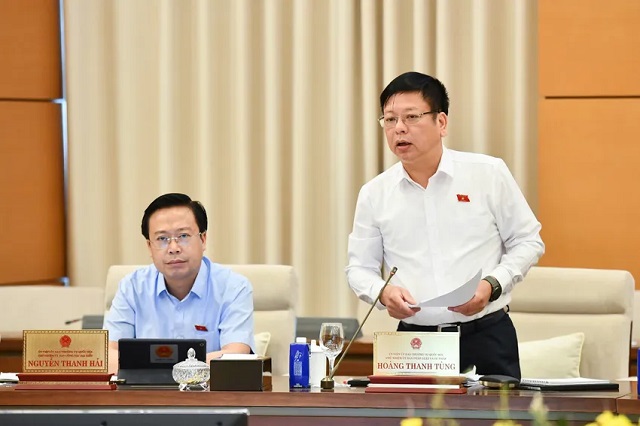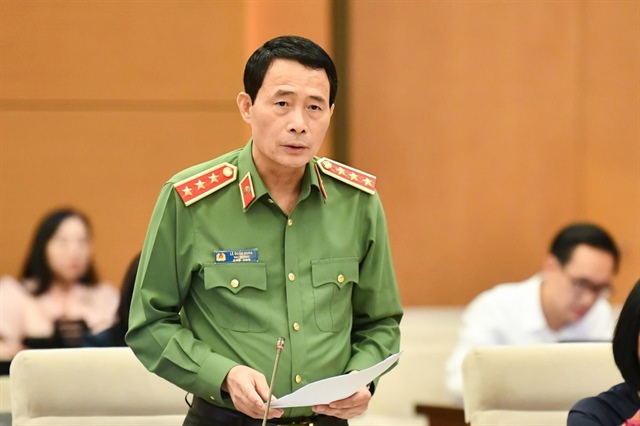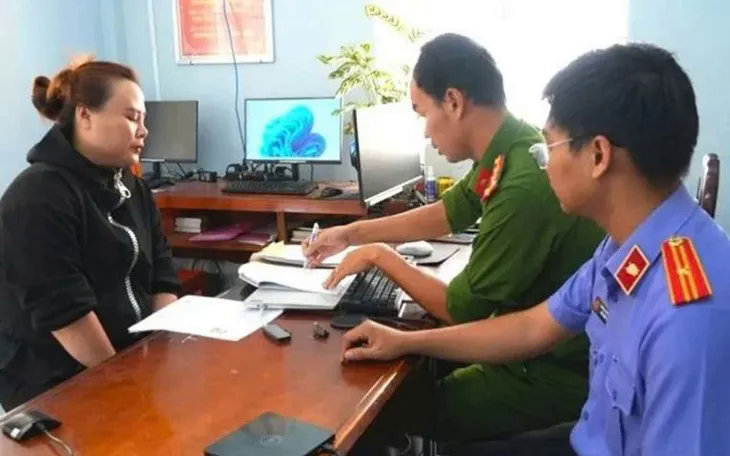On the morning of the 5th of June, the National Assembly’s Standing Committee listened to a report on the explanation, adoption, and editing of the draft Law on Personal Data Protection.
A maximum fine of 5% for large enterprises is a significant amount
Commenting on the draft law, Mr. Nguyen Truong Giang, Vice Chairman of the Committee for Legal and Judicial Affairs, stated that the regulation on the sale of personal data, which is prohibited under Clause 6, Article 7 of the draft, is vague and does not anticipate practical issues.
The entities involved in the transaction may perform acts to circumvent the law through beneficial transactions such as gifts, exchanges, rentals, and so on.

Mr. Nguyen Truong Giang, Vice Chairman of the Committee for Legal and Judicial Affairs. Photo: QH
|
In addition, Clause 4, Article 17, which pertains to the transfer of personal data and the cases stipulated in Clause 1 of this Article, involves fees, no fees, and is not considered a sale of personal data. “In other words, it cannot be sold but can be transferred,” he said, requesting clarification on how a transfer with a fee differs from a sale.
Regarding administrative sanctions for violations in the field of personal data protection, Mr. Giang mentioned that the law has been adjusted to impose a “maximum fine of 5% of the previous year’s revenue of the organization” for violations related to the cross-border transfer of personal data.
According to the Vice Chairman of the Committee for Legal and Judicial Affairs, for large enterprises such as Viettel, which had a revenue of 189,900 billion in 2024, and VNPT, with 58,500 billion in revenue… If this maximum fine of 5% is applied, the amount will be substantial.
Vice President of the National Assembly, Mr. Vu Hong Thanh, opined that violations in personal data protection have a very negative impact on society and individuals whose data has been breached. Therefore, if only regular administrative fines are imposed, the deterrent effect may not be guaranteed…
Regarding the maximum fine of 5%, Mr. Thanh believed that it could be applied to small businesses, but for the “large” enterprises mentioned by the Vice Chairman of the Committee for Legal and Judicial Affairs, the Government would probably provide appropriate guidance later. “Because 5% of hundreds of thousands of billions is an extremely large number,” said Mr. Vu Hong Thanh.
Prohibiting the sale of personal data is in line with international practices
In his explanation, Mr. Le Quoc Hung, Deputy Minister of Public Security, stated that in the context of digital transformation and harnessing the potential of data, personal data is an important resource but must be used efficiently, reasonably, and in accordance with the principle of protecting human rights and civil rights.

Deputy Minister of Public Security Le Quoc Hung. Photo: QH |
According to Mr. Hung, personal data is closely linked to individuals, human rights, personality rights, and privacy, and therefore cannot be treated as ordinary goods or assets. It is a special type of resource and asset that requires strict and maximum protection in terms of exploitation and usage.
“Allowing the sale of personal data is tantamount to permitting the sale of individuals, the sale of human rights, and the right to dispose of another person’s personal information,” said the Deputy Minister of Public Security. He went on to say that the view of prohibiting the sale of personal data aligns with international practices and the regulations of other countries regarding personal data protection, prioritizing development alongside the protection of rights and interests.
On the other hand, Mr. Le Quoc Hung acknowledged that many organizations, businesses, and individuals have limited awareness about personal data protection. The importance of protecting personal data has not been fully realized, creating “bright spots” in the use of personal data.
In major fraud cases involving the appropriation of assets on a large scale that the Ministry of Public Security has cracked or is investigating, the element of personal data leakage and illegal sale has been the main cause of complex black markets for personal data. The source of illegally collected personal data may come from activities such as attacks, appropriation, illegal transfer, or sale of personal data, or the use of high technology to ‘scrape’ personal data for the perpetrators’ purposes.
Therefore, to ensure clear distinctions and prevent legal loopholes, the law has supplemented provisions prohibiting the use of another person’s personal data for one’s own benefit or to enable another person to use their personal data for illegal activities. Additionally, provisions on the transfer of personal data have been added, stipulating that the transfer of personal data with or without a fee is not considered a sale of personal data.
The representative from the Ministry of Public Security also stated that due to the very serious nature of the violations, higher fines are necessary to ensure a deterrent effect on large enterprises, especially multinational corporations or high-tech businesses with revenues in the thousands of billions of VND.
“If the fines are too light, large, cross-border businesses will be willing to violate the law to transfer personal data across borders and reap enormous profits,” he said, citing international experiences where many countries stipulate high fines in this field, such as the EU, Singapore, and Indonesia, with fines ranging from 4 billion to 584 billion VND.
NGUYEN THAO
– 10:21 06/05/2025
“Chairman of the National Assembly: Counterfeit Goods are Rampant, Yet No Agency Takes Responsibility”
“The Speaker of the House demanded a clear delineation of responsibilities among government ministries and departments. Despite the rampant issue of counterfeit and imitation goods, no single authority has taken primary accountability, underscoring the urgent need for defined roles and ownership in combating this pervasive problem.”
Bidding Rigging: The Unscrupulous Son-in-Law and His Father-in-Law’s Company.
Mr. Nguyen Khanh Quan, former deputy director of the Project Management Board for Investment, Construction, and Land Fund Development in Huong Hoa district, acted as the leader of the bidding evaluation team for a joint venture of two contractors. One of the contractors, Loc Phu Co. Ltd., had a legal representative who was Mr. Quan’s father-in-law. This act contravenes Article 89 of the 2013 Bidding Law.
“The Ministry of Justice Denies Raising Fines for Administrative Violations”
The Ministry of Justice has confirmed that the latest draft law presented to the National Assembly does not propose any increase in maximum fines across any fields of state management.





















